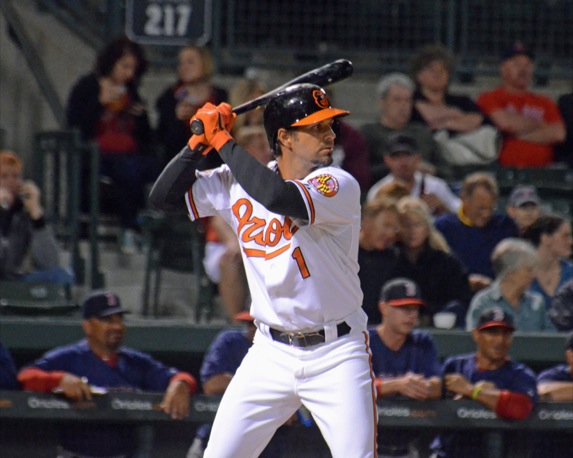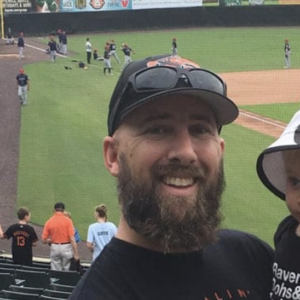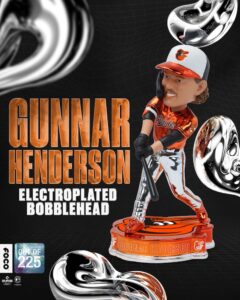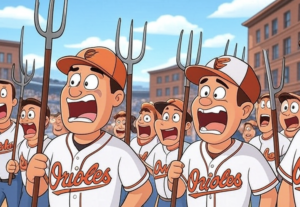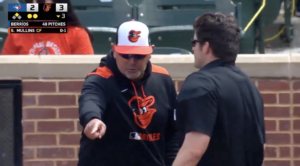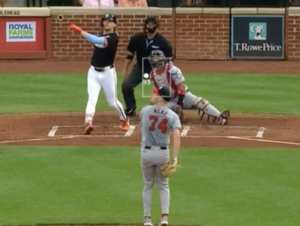Over at FoxSports today, Ken Rosenthal has a great piece up about Brian Roberts’ long road to recovery from concussions he suffered in September 2010 and May 2011.
Rosenthal details the painstaking process that Roberts, his doctors, and his wife Diana have gone through over the past several years, which have been at times as taxing emotionally and psychologically for all involved as it has been physically for Roberts.
For instance:
Diana knew what she saw – her once-vibrant husband, the Orioles’ energetic leadoff man, lying on a couch in the dark for “months and months,” unable to function normally, much less play baseball.
[…]
At first, as the symptoms took hold, his goal was simply to get healthy.
“Most of the days, I wasn’t even sure if it was ever going to go away,” Roberts says. “Forget baseball. I wasn’t even thinking about baseball. I was just thinking about the fact that I wanted to be the person that my wife knew when she married me, the person I had been.”
As it turned out, even getting to that point was a struggle. Brian, Diana says, “was having a hard time just living everyday life.”
Full disclosure – Roberts is one of my favorite O’s of all time. Call him my favorite Oriole of the modern era (Eddie will always be #1 overall). I’ve been known to chastise fans for getting too emotionally invested in players – for example, with the Ravens’ purging of their Super Bowl roster, I shake my head as others whip themselves into a frenzy over moves that, in the long run, will surely help the team, but are nonetheless painful in the short term as familiar players and fan favorites say goodbye.
But it’s one thing to approach the business side of sports coldly – players change teams all the time, and fans shouldn’t let attachment to individual players take precedence over what’s best for the team itself – it’s another to want the guys you root for to at least be healthy and happy in life in general.
Which is why, during the entire Roberts saga these past few years, I’ve winced listening to sports talk radio callers say that Roberts is “stealing” money from the Orioles, and that the Birds should just cut their losses with the second baseman. While contracts in baseball and football are apples and oranges – no salary cap, guaranteed money, etc. – weren’t these callers just taking the approach that I advocate about putting the team first? Yes, the team would be paying Roberts’ contract whether they cut him or not, but was his presence on the roster impeding the elevation of potential talent behind him (probably not, but the case could be made)?
Maybe they were, but the name-calling rubbed me the wrong way.
In the words of Bob Haynie, “but I digress…”
I remember reading an article about Roberts last offseason that was similar to Rosenthal’s. In that one, Brian and Diana described how he had trouble with even everyday chores like walking the dog and pushing a grocery cart due to the “fogginess” caused by his concussions.
Rosenthal:
Collins described Roberts’ primary symptom as “fogginess,” adding, “I know it sounds very cryptic.” To a normal person, walking through a crowded place, be it a hallway, mall or ballpark, is no problem. But Roberts, Collins says, would feel, “foggy,” in such situations, “kind of one step behind, sort of outside himself, slow.” He would suffer headaches, dizziness, vision problems. Merely moving his eyes would cause him stress.
Even when Roberts resumed baseball activities, he needed to take special precautions. Collins recalls consulting with the Orioles’ training staff, telling them to limit the number of people on the field when Roberts performed drills. Not even re-acclimating to a batting cage came naturally.
Roberts’ problems weren’t just physical, either.
“Physiologically, it can kick off emotional stuff,” Collins says. “The same neuro-chemicals that kind of feed the (vestibular) system feed the emotional circuitry in the brain.
“He’d feel down. He’d feel anxious. He’d feel crushed from an emotional standpoint. Which, of course, exacerbated all of the physical symptoms he was feeling as well.”
Diana Roberts recalls tapping on her computer, researching Brian’s condition as he lay on the couch. Collins recalls Diana calling him three or four times during periods “when Brian had kind of gone to that darker place.”
Now, were those calling Roberts a “thief” just putting the team first, were they simply uninformed, or were they being intentionally callous to another human being – one who, if they were a real O’s fan, had brought them a good deal of joy in the past?
Brian Roberts wasn’t “stealing” from the team. The guy couldn’t even walk his dog, be the husband he wanted to be, or turn on the lights in his house, let alone perform his duties as a major league baseball player.
Which is why I was as overjoyed as anybody when Brian finally made his return to the lineup last June and had a vintage B.Rob night – 3-4 with three singles and an RBI, including a six-pitch AB for his first hit leading off the bottom of the first. After the game, Adam Jones was appropriately gentle with the shaving cream pie:
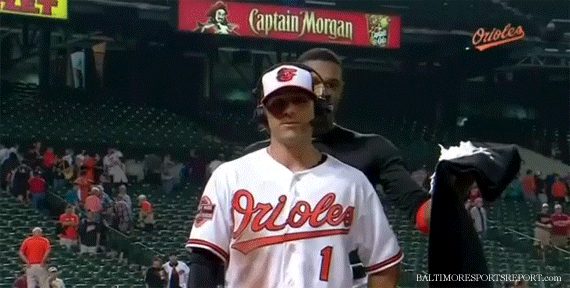
(c/o Baltimore Sports Report)
Unfortunately, the good feelings from that night were short-lived. As Rosenthal notes, Brian hit just .182 with a .415 OPS in 17 games last year before tearing the labrum in his right him and spending the rest of the season as a cheerleader.
It was torture as a fan to watch Roberts, who had suffered through so many dismal seasons in an Orioles uniform, unable to participate in the team’s magical stretch run or take the field for his first ever playoff game.
(Don’t even get me started on those who suggested that he “messed up the team’s chemistry” when he was in the lineup. Complete and total nonsense.)
According to Rosenthal, Roberts still wasn’t 100% last year though. Things are supposedly finally back to normal.
So here is Roberts in the spring of ’13, recovered from his concussions, recovered from his recent hip and sports-hernia surgeries, seemingly reborn.
Over the past three seasons, Roberts has played in only 115 of the Orioles’ 486 games, or 23.7 percent. But this spring, he’s batting .357 with a .937 OPS in 46 plate appearances, and has stolen three bases in four attempts.
“He looks just like I remember him,” Orioles outfielder Nate McLouth says. “He would be as good as any off-season addition you could make.”
But can Roberts be the same player he once was?
As to Rosenthal’s question above, I don’t know. At 35, it’s admittedly extremely doubtful. But it’s not like the O’s have Robinson Cano waiting in the wings either. If Brian can play 150 or more games, and approach his career averages of .280/.351/.413, and steal 20-30 bases, he’s still likely the Birds’ best option at the top of the lineup (most fans seem to agree).
I am very hopeful that we can see Brian put together a few more productive seasons, perhaps play in his first meaningful September game and/or get his first postseason at bat, and ultimately end his career on his own terms.
However, even if he is unable to ever again be a productive everyday Major Leaguer, I truly hope that his life-altering concussion issues are behind him once and for all.
More importantly than ending his baseball career the way he’d like, the guy we’ve all cheered on for so long should be able to step into his post-MLB life seamlessly and happily.
Good luck both on the field and off, Brian.


